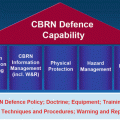© Springer Science+Business Media Dordrecht 2015
Samuel Apikyan and David Diamond (eds.)Nuclear Threats and Security ChallengesNATO Science for Peace and Security Series B: Physics and Biophysics10.1007/978-94-017-9894-5_1313. The Strategic Impact of an Iranian Nuclear Weapons Capability on Israel
(1)
Center for Homeland Defense and Security, Naval Postgraduate School, Monterey, CA, USA
Abstract
This paper will address the likely strategic impact of an Iranian nuclear weapons capability on Israeli security, both in terms of the country’s regional standing within the Middle East, and in terms of its homeland security issues. It should be emphasized that an Iranian capacity to produce and deploy nuclear weapons in a fairly short period of time will have largely the same strategic impact on Israel as an already existing Iranian nuclear weapons capability because Iran will be able to claim that, by developing this capacity, it will be able to counter Israeli “aggression” in the Middle East, thus enhancing its prestige in the region and beyond. Moreover, an Iranian capability to develop and deploy nuclear weapons may embolden Iran to risk further confrontation with Israel, the United States, and America’s Arab allies because a nuclear weapons capability is likely to be perceived in Teheran, particularly by regime hardliners, as an insurance policy against a catastrophic attack on Iran that could threaten the regime’s hold on power. Finally, even if Iran does not actually build nuclear weapons, once it has the capacity to build them in a short period of time, Israel will need to think about the implications of their use against Israeli cities and what this means for its homeland security.
Given the aforementioned, Iran does not need to actually possess nuclear weapons in order to reap the benefits of being a nuclear power, particularly since there is little evidence to suggest that Iran, although an extremist power, acts irrationally and would actually want to use such weapons against Israel. Despite the anti-Israeli views held by Iran’s leadership, Tehran’s relationship with Jerusalem seems to have been impacted by Iranian perceptions of their geopolitical interests rather than motivated solely, or even largely, by ideology (Trita Parsi, Treacherous Alliance: The Secret Dealings of Israel, Iran, and the United States (New Haven: Yale University Press, 2008), Kindle Edition, location 3581.). The problem for Israel is that Iran views itself as a major regional player, given its size and historical importance, and this means that it will almost necessarily view Israel, which is arguably the strongest military power in the Middle East, as a rival. This tendency is reinforced by the understanding in Teheran that the key to enhancing Iran’s regional influence and undermining American power lays in gaining Arab allies rather than in developing friendly relations with Israel (Dalia Dassa Kaye, Alireza Nader, Parisa Roshan, Israel and Iran: A Dangerous Rivalry (Santa Monica: RAND, 2011), p. 56.). Moreover, Iran takes its self-proclaimed role as a leader in the Islamic world seriously and this too, given the widely perceived view that Israel is occupying the city of Jerusalem, with its Muslim shrines, and oppressing the (mainly Muslim) Palestinian people, also ensures that it stands to benefit more from a state of rivalry with Israel than one of rapprochement (Michael Eisenstadt, The Strategic Culture of the Islamic Republic of Iran: Operational and Policy Implications, MES Monographs, No. 1 (Quantico, VA: Marine Corps University, 2011), p. 3.). This is not to suggest that Iran will have an interest in risking its own security by engaging in a nuclear war with Israel, only that having a nuclear capability of some sort (either existing or easily acquired when needed) will provide Iran with more leverage in its “Cold War” with Israel.
This analysis will be organized around three elements: (1) the nature of recent changes in the Middle East and their implications for the rivalry between Israel and Iran, (2) how an Iranian nuclear capability (realized or potential) may impact that rivalry and events in the region more broadly, and (3) a brief discussion of Israeli homeland security/civil defense issues in the context of the extremely low probability, but unimaginably high consequence, possibility of an Iranian nuclear strike on Israel.
13.1 The Radically Changing Middle East: Implications for the Rivalry Between Iran and Israel
While most commentators could not predict it at the time, the Arab uprisings in early 2011 have led to the breakup of Libya, Syria, and Iraq and are currently threatening the stability, such as it is, of Lebanon. Egypt, arguably the most important Arab country, is holding together with generous amounts of financial aid from some of the Persian Gulf states, but has had to deal with an insurgency of sorts in the Sinai and is absorbed in suppressing the Muslim Brotherhood. Both Jordan and Saudi Arabia are threatened by the rise of the Islamic State (IS) in Syria and Iraq and there is no guarantee that these countries will remain stable in the long term.
For the last several decades, particularly since the Iranian revolution of 1979, Middle East politics has been characterized by the push and pull of relations between Israel, Iran, and the major Arab countries. At present however, the intense disarray in which the Arab World finds itself, with key countries such as Syria and Iraq unable to play their traditional role, means that there are fewer major actors to compete for regional influence. Essentially, the list of the main actors in the region can be limited, at present, to Egypt, Israel, Saudi Arabia, and Iran, with Turkey and some of the Gulf States playing a lesser role. As Israel’s Operation Protective Edge and the subsequent ceasefire between Israel and Hamas have shown, diplomatic cooperation between Egypt and Israel is extremely close (albeit largely behind the scenes) and it is likely that the Saudis (Egypt’s primary financial supporter) are closely involved. This leaves Iran severely isolated in the region. While it still has allies and surrogates in the Middle East, most notably Hezbollah and the Assad regime in Syria, the political changes in Baghdad could result in diminished Iranian influence over Iraq—either due to the efforts of a more inclusive government under the new Prime Minister, Haider al-Abadi, to woo Sunnis and Kurds (which necessarily requires distancing from Iran), or under the scenario that the Iraqi state collapses completely (in which case Iran would only have influence over the rump Shi’a part of Iraq). In other words, the Syrian civil war, the overthrow of the Muslim Brotherhood government in Egypt, and the rise of IS, have presented Iran with an acute challenge and have resulted in a significantly diminished regional influence. Given this situation, it is likely that Iran will try to attempt to regain some of that influence through stabilizing Iraq (and ensuring its new government takes into account Iranian interests through ensuring continued Shi’a control1), supporting Assad’s effort to regain control of Syria’s largest city, Aleppo (as part of his attempts to claw his way back to a position of control over significant portions of Syria), and trying to coax Saudi Arabia and Egypt away from their current relationship and commonality of interests with Israel. This should be possible because—while Egypt and Saudi Arabia are currently focused on what they perceive as the “Muslim Brotherhood threat” in, among other things, its Hamas manifestation—the growing power of IS, which has deployed to the Saudi Border with Iraq, means that Iran can make a case for common cause with the Saudis and their Egyptian allies against this new and frightening Jihadist threat. While criticism of Iran in Sunni Arab countries has been fierce, owing to the Islamic Republic’s support for the Assad regime in Syria and the general suspicion of “Persian intentions” in the region, Sunni Arab states such as Saudi Arabia and Jordan are becoming increasingly fearful of the growing power of radical Sunni Jihadist groups such as IS. Given that Iran, and its clients, the Syrian and Iraqi governments, are probably in the best position to blunt and eventually push back the advances of IS and Al-Qaeda affiliates such as al-Nusra, there are grounds for predicting that a rapprochement of sorts will emerge between Iran and moderate Sunni Arab countries. As Israel has little to offer the Saudis and others in the moderate Sunni camp with respect to the fear of growing Jihadi strength in Syria and Iraq, they are more likely to be interested in cooperation with Iran, provided it undertakes not to try and influence domestic politics in Arab countries, and this will ultimately strengthen Iran’s hand.2
The seeming potential commonality of interests between Iran and moderate Sunni Arab states due to the IS threat also appears to hold for relations between Teheran and Washington. Both sides have a strong common interest in weakening IS and other Jihadi groups and in creating a stable Iraqi government—though, with the caveat that each side interprets stability in Iraq differently and, for the Iranians, stability means that Iraq’s government must continue to maintain its “special relationship” with Teheran.3 These, at least partially-shared interests, coupled with the anemic relations between Jerusalem and the Administration in Washington, make a rapprochement of sorts between Washington and Teheran more likely. If a nuclear deal is signed (a deal that could still leave Iran in possession of the capacity to manufacture nuclear weapons), this could lead to stronger US-Iran relations without the need for Iran to soften its approach towards Israel, particularly if it perceives American-Israeli relations as having been downgraded due to public spats between the Netanyahu Government and the Obama Administration. Consequently, here too, there is little hope for an Iranian assessment that it will be in their interests to reduce their hostility towards Israel.
Confronting Israel also provides potential benefits for Iran in trying to delegitimize its Jihadi rivals in Syria and Iraq. While moderate Sunni Arab states have been attacked by Jihadi groups for failing to confront Israel, a more hostile Iranian approach to Israel could allow the Iranians to argue that they are resisting “Israeli aggression” while the Jihadi groups only provide lip service to this idea and instead focus on killing other Muslims. Indeed, Iran’s ally, Hezbollah Secretary-General Hassan Nasrallah, has claimed on at least one occasion that the Jihadis are furthering Israeli interests.4
13.2 Closer to Home: Iran’s Impact on Hezbollah and the Palestinian Organizations
A confrontational approach towards Israel on the part of Iran could also help it rehabilitate Hezbollah, an organization who’s legitimacy in the eyes of Sunni Arabs was significantly degraded after that organization seemingly decided to abandon the path of resistance to Israel in favor of propping up the hated Assad regime. A shift in Hezbollah’s focus back to Israel could help it try and rebuild some of its lost legitimacy, and Iran’s influence over Hezbollah could be exercised towards this end. However, such a change is likely to occur only gradually because, with Hezbollah’s recently announced redeployment of at least some of its forces from Syria to Lebanon, it appears that the Lebanese Shi’a organization is gravely concerned with the threat that IS and other Sunni Jihadi groups pose to its position in Lebanon.5
Finally, in the wake of the 50 days of fighting between Israel and Hamas in the context of Operation Defensive Edge, Iran has the opportunity to rebuild its relationship with Hamas, which was seriously damaged when Hamas decided to side with the rest of the Sunni Arab world against the Assad regime in Syria. Given the damage sustained to Hamas’s infrastructure during Operation Protective Edge, Hamas will be looking to resupply itself with contraband and Iran can use this to rehabilitate this relationship and use it to gain credibility in the Arab World and as another tool with which to be seen to confront Israel. Nevertheless, there is likely to be continuing distrust on Iran’s part of Hamas given that the organization abandoned Iran’s Syrian ally and it is heavily dependent on Qatar (and to a much lesser degree, Turkey), and these countries are not interested in Iran enjoying a greater degree of influence in the region.
Iran’s continued pursuit of nuclear enrichment, nuclear weapons technology, and delivery systems, even if they do not lead to the actual production of a bomb (just the potential for comparatively rapid production and deployment), can serve to enhance Iran’s position on all these fronts for three reasons. Firstly, it will greatly enhance Iran’s prestige as the country that was able to achieve a nuclear capability despite Israeli military threats and Western economic sanctions. The Iranians can thus portray themselves as having successfully stood up to Israel and the West in order to realize their “national rights”—something that will gain regional admiration in the same way that Saddam Hussein was lionized by many in the region for his willingness to face the United States prior to the first Gulf War. Secondly, Iran can portray this nuclear capability, or capacity, as an effective way of deterring Israel and thus containing what many view in the region as Israel’s tendency to try and dominate the Middle East (while this is completely at odds with Israel’s view of its own role, it is nonetheless the popular perception). Thirdly, as a de jure or de facto nuclear power, Iran can claim that this capacity will deter American or other Western intervention in the region and thus that Iran can ostensibly defend the region from Western encroachment.
Stay updated, free articles. Join our Telegram channel

Full access? Get Clinical Tree






